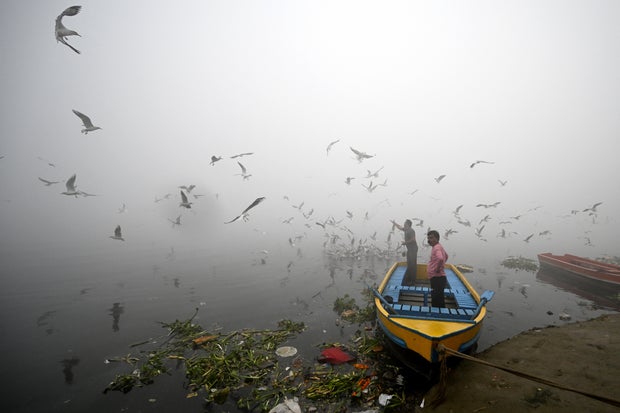Thick smog blanketed India’s capital Thursday as the annual ritual of choking on incredibly polluted winter air took hold of New Delhi yet again. Authorities ordered many students to stay home as the smog delayed more than 300 flights and prompted health warnings and a halt to all construction activity in the city.
The air quality rating in the densely packed city of roughly 33 million people first spiked on Wednesday to the highest “severe” category, under the World Health Organization’s Air Quality Index ratings. With an AQI reading Thursday afternoon above 450, Delhi was contending with the worst air pollution in any city in the world.
Any reading over 150 on the AQI index — which measures the levels of five key pollutants harmful to human health in the air at any given time — is considered unhealthy. When the AQI rises to 301 or above, it’s considered an emergency, and harmful to all people.
ARUN SANKAR/AFP/Getty
Higher AQI levels pose serious health risks, particularly for children, the elderly and those with respiratory issues, who can all be affected at even lower levels.
Indian authorities have advised Delhi residents to limit their outdoor activities and, Thursday night, the Delhi government announced enhanced anti-pollution measures, banning all non-essential construction and demolition work and restricting the entry of buses and trucks to the city. Elementary school students were told to switch to remote learning for Friday.
The use of diesel generators was also to be restricted from Friday.
Delhi’s Indira Gandhi International Airport issued an advisory to air travelers Thursday, saying “low visibility procedures” had been enacted at the busy airport. Earlier, the IndiGo airline asked passengers to keep tabs on their flight status and leave for the airport early due to the low visibility on roads around the airport.
In addition to the hundreds of flights delayed Wednesday, at least 10 flights were diverted from Delhi altogether.
Delhi’s air quality started worsening at the beginning of November, when fireworks lit up the skies for the Diwali Hindu religious festival.
The city sees a major spike in air pollution every winter due to several factors, including the burning of farm waste in the adjoining states of Haryana and Punjab.
Last year, the air quality readings went off the charts, prompting authorities to shut down schools for weeks.






